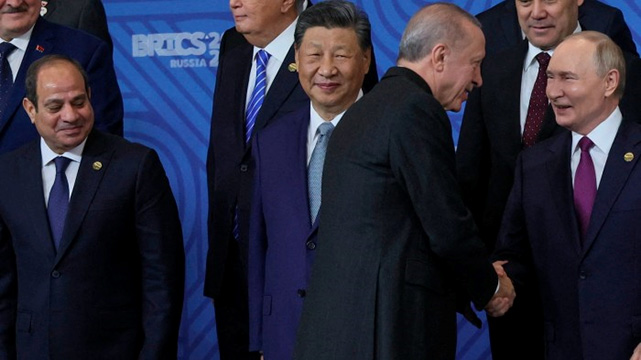 Turkey’s President Recep Tayyip Erdoğan is greeted by Vladimir Putin at the Kazan BRICS summit, while Abdel Fattah al-Sisi of Egypt, left, and Xi Jinping of China, centre, look on.
Turkey’s President Recep Tayyip Erdoğan is greeted by Vladimir Putin at the Kazan BRICS summit, while Abdel Fattah al-Sisi of Egypt, left, and Xi Jinping of China, centre, look on.
Photo: AFP
The participation of EU partner nations in a summit in Russia hosted by Vladimir Putin is a message for Brussels to stop “lecturing” other parts of the world, said the top official representing the bloc’s governments. European Council president Charles Michel told the Financial Times that the EU needed to show more respect towards developing countries with which the organisation has signed strategic, trade or political co-operation agreements if it wanted to combat Chinese and Russian efforts to expand their influence in Africa, Latin America and south-east Asia.
“We are convinced that we know what is right and what is wrong. And we don’t make the effort, at least, to understand what are the reasons for which [other countries] think another way,” Michel said.
“At the European level... there is a reflex which is close to a form of lecture,” he said. “We are not always very good in terms of communication, in terms of explanation, in terms of talking with them and showing a certain respect to them.”
Michel spoke as two dozen leaders, including Recep Tayyip Erdoğan, the president of EU candidate and NATO member Turkey, as well as partners such as Egypt and the United Arab Emirates, joined a BRICS summit hosted by Putin in Kazan, which has been pitched by the Russian president as a riposte to a western-led global ideology.
“It shows something if a country like Egypt, very close to us and very close to the US from a military point of view, if a country like the Emirates, very close to us in terms of economic partnerships... are making the choice to be in Kazan, they want to send a message to the rest of the world,” Michel said.
“One of the emirs in the Gulf countries once told me if there is a vacuum, very quickly someone will fill the vacuum. And if you are not there, others are there,” he said.
Michel, who will step down on November 30 from his role, which involves chairing summits of EU leaders and representing the 27 countries internationally, said that Brussels should be proud of its record of developmental aid and upholding key values.
He added that many of these nations wanted to diversify their economic and security alliances, reducing dependencies on China and Russia. But the EU needed a new approach to win them over.
He recalled one meeting with an unidentified African president in 2022 who said: “When you Europeans come to my country... you leave lessons. When the Chinese come, they leave infrastructure.”
“I’m not saying that they are right or they are wrong. I’m just explaining that we are not making the effort to understand,” Michel added, saying that this approach did not help “to convince them and to influence them”.
Michel said that the EU’s approach to enforcing its standards and regulations on trading partners, such as over fishing rules, was often “humiliating”.
“We use the vocabulary: yellow card or red card,” Michel said, describing EU language on breaches of standards. “The words we use are really humiliating because we give the impression that we are a player on the pitch, and at the same time the referee.”
…It seems that in EU they have realized that it needs to change the colonial tone in relations with the Global South. Perhaps they were late with their discovery...
read more in our Telegram-channel https://t.me/The_International_Affairs

 10:19 26.10.2024 •
10:19 26.10.2024 •






















